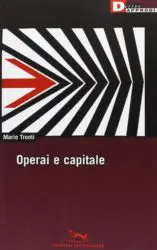
Mario Tronti, “The Struggle Against Labor”
Tronti, Mario. “The Struggle Against Labor,” in Operai e Capitale (“Workers and Capital”), Einaudi, Turin, 1966.
Review by Hayyim Rothman
Italian philosopher Mario Tronti wrote an influential book called Operai e Capitale in 1966. Since then, parts of the book have been translated into English, including a section titled “The Struggle Against Labor.” In this section, Tronti distinguishes himself from early Marxist thinkers, who operated under the Hegelian idea of alienation and alienated labor. This earlier approach assesses the redeeming quality of labor when it serves as a mode of self-actualization. Tronti, on the other hand, focuses on the realities of labor under capitalism.
“Labor equals exploitation,” Tronti declares. “This is the logical prerequisite and historical result of capitalist civilization . . . Workers have no time for the dignity of labor.” Rather than workers benefiting from their own production, Tronti argues, the “‘pride of the producer’ they leave entirely to the boss.”
Tronti’s analysis includes a call to action. He argues that the working class has within itself the power to understand capital––and destroy capital. “It has to recognize itself as a political power, deny itself as a productive force.” By recognizing the capitalist tendency to treat the working class as a hostile force, laborers can organize their grievances around this understanding.
I take this to mean that the political power of the worker is expressed in his or her ability to strike. I question, however, just how much power the average worker really has to strike today. The consequence of unemployment today are far in advance of what they once were. Tremendous sacrifice is demanded of the potential striker when basic protections are quickly eroding.
But perhaps my reaction is only another reflection of the problem Tronti wishes to resolve. As Tronti argues in 1966, “The closer we look, the more passivity emerges as the most potent barrier… to future revolutionary possibilities. The truth is that the massive withdrawal by the working class, its refusal to consider itself an active participant in capitalist society, is already an opting out of the game, a flouting of the social interest.”
This state of affairs, Tronti concludes, is a response to a tremendous defeat on the part of the working class and a consequent leap forward in capitalist development. But Tronti also sees the possibility of turning passivity into a weapon. “Passive non-collaboration in the development of capitalism and active political opposition to the power of capital are precisely the starting point and direction of this organizational leap”––i.e. the leap toward revolution. Why? Because “suppression of labor by the working class and the violent destruction of capital [the abolishing class domination] are one and the same.”
In short, Tronti locates the center of capitalist gravity in production. If workers refuse to work and bring production to a halt, then capitalism crumbles. It is unclear to me how this theory of Tronti’s differs from the old notion of the strike, general or otherwise.
From a theoretical perspective, Tronti’s work is clearly in line with prior works. As Tronti himself notes, “None of this will be possible without the highest degree of violence––this we know from experience.” However, Tronti distinguishes himself by arguing that this violence must target production itself. “All the social upheavals of the past left intact the form of productive activity.” For Tronti, a true revolution is only possible if workers can withhold their productive force and wield political power.
Return to the reviews or the annotated bibliography
Hayyim Rothman has a PhD in Philosophy from Boston College and recently received a Fulbright postdoctoral research fellowship to work at Bar Ilan University in Israel.